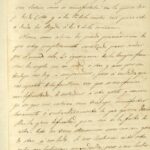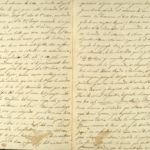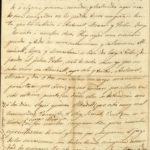- Transcription
- Description
- Notes
We have respected the spelling and grammar for each transcription, without modification or modernization. Abbreviations are transcribed as follows: “pa: para”, etc.
Spanish Transcription
Marsella 18 de noviembre de 1869
Queridas Isabel y Aurea: ayer pasé todo el dia con Suñer, como os manifestaba en la que os diriji desde Cette y á las 12 de la noche salí para esta á donde he llegado á las 8 de la mañana.
Nunca como ahora he podido persuadirme de que estoy completamente inutilizado para andar por el mundo solo. La ignorancia de la lengua francesa la suplo con un ardid ú otro, y aun que con trabajo me doy á comprender; pero á medida que me aparto de la frontera veo que se me ofrecen mas dificultades de entender á esta gente y convengo en que me costará mas trabajo manifestar claramente ó embrolladamente lo que quiera decir. Mas la gran dificultad para mi es la falta de vista. Esto no tiene atenuacion como no sea yendo otro á mi lado. Si me hubieseis visto esta noche me hubierais compadecido; pero si me hubiesen observado otros se hubieran reido con razon de mis percances de viaje. Estaba ni mas ni menos que “Gerónimo Paturot en busca de una posicion social.”
[1v] Vedme en la estacion de Cette, sudando el quilo con la maleta de aqui para allá, buscando el despacho de billetes, luego el salon de 2ª clase, acabando por meterme en el de 3ª, luego corriendo á ciegas de [aqui] un lado para otro en el anden, preguntando al primer bulto que veia cual era el tren de Marsella entre los varios que allí habia; contestandome uno de un modo intelijible, otro en frances tan cerrado que no entendia su contestacion; gritando los empleados: “alé, alé, si vu plé, monsiurs”, metiendome luego en el departamento de señoras en que pude distinguir el nº “2ª classe”, teniendo luego que bajar, buscar nuevo coche, y se me ofreció cuando andaba que seria de 1ª por lo cómodos que son aqui los de 2ª y temiendo tener que aumentar al fin del viaje el esceso del pasaje… En fin todas las tragedias del viajero ciego, solo, y mal humorado en tierra estraña. Pero no concluyó aqui la cosa, sino que creyendo que el tren era directo para Marsella como se me habia dicho, por poco voy á parar á Paris ó cerca de él, sólo una casualidad me ha evitado el conflicto en que me hubiera visto, aparte de pagar tan largo viaje, de encontrarme en un punto tan popular y laberíntico sin [2v] persona alguna amiga á quien dirijirme para tomar posada al alcance de mis escasos recursos. En Tarascon el tren toma la via de Paris y los demas viajeros bajan y toman unos el de Lion y otros el de Marsella. La curiosidad de un viajero me ha valido. En la estacion de Nimes quedé solo y al partir el tren entró una especie de D Simon, tan cargado de equipaje iba, y me ha preguntado si iba yo á Marsella, le he contestado que si y ha esclamado “Eh tre bien” yo creyendo que se alegraba por tener compañia me he equivocado; se alegraba porque podria ir solo. Hemos llegado a Tarascon, el mozo ha hecho un gran pregon del que no he entendido una palabra y no me he movido del coche; el viajero mi vecino dormia y la gente iba saltando á la estacion. Hacen la señal de partir, despierta el compañero y me dice ¡ah monsiur á Marsella! á Marsella; yo hacia el sueco y él añadió que el tren iba á Paris aqui de mi apuro, cojo tapabocas y saco y gracias á que no habia silvado la maquina si no se me llevan camino de Paris. Luego he tenido mis apuros para no confundir el de Lion con el de Marsella, aun que ahora no hubiera sentido la equivocacion.
Por fin en Marsella he tenido que meterme en la primera fonda que he encontrado y creo que me [2v] he metido en una de muy cara pues me han hecho sobrada buena vida en el almuerzo. No comeré alli para ahorrar, y si bien dormiré, será esta noche solamente, pues mañana me voy a Lion. He buscado desde las 8 de la mañana hasta las 4 de la tarde á alguna persona conocida, y habiendo aqui mas de cien emigrados no he podido tener compañia hasta que he hallado á Antonet, Morros y Feliu. Luego he visto á muchos otros. Hay aqui una escision grande y todo son murmuraciones y calumnias. Almirall, Lopez y Serraclara se han ido hoy á Tolon, dejando al pobre Feliu, corto de vista como yo que no sabe vivir sin Almirall, aqui solo y triste. Antonet, Morros y dos ó tres mas salen conmigo mañana para Paris por Lion; yo me quedaré por ahora en este ultimo punto, en donde ellos se detendrán uno ó dos dias. Aqui quedan Altadill (que está muy mal humorado); Joarizti, el Noy, Simal, Boet (con su señora), <el primo de Fernando>, en fin muchos comprometidos, pero muchos especuladores de mal genero que chuparán el jugo de las suscriciones sin haber tenido ninguna necesidad de emigrar. Por esto precipito mi ida á Lion, á donde de hoy en adelante me escribireis con el sobre “Francia. Mr. Pierre Bigol, cafe espagnol, boulevart del empereur, Croix Rousse –Lyon” (sin poner otro sobre.
Abrazo y saludos a todos. Vuestro de todo corazon
Jose
<He concluido el papel–Escribiré mas despacio desde Lion>
Description
Clavé is in exile in France. He travels through Southern France by train, his final destination will be Lyon. He writes from Marseille where he has stopped to spend one day. This letter is one of many to offer lengthy descriptions of travel conditions by train in the nineteenth century.
The compositor says he does not understand French, which made his trip difficult. He complains about his eyes, he talks about himself as a blind traveler, a “viajero ciego,” which is both literal and metaphoric. Indeed, Clavé had eyesight problems from a young age. Furthermore, the qualification of a blind traveler here indicates his exiled condition: he was forced to leave for a foreign country, he has to communicate in a language he does not master, and he does not know when he will return home.
Clavé travels with a second-class ticket, but he accidentally boards in third-class. He got confused because the train’s second class seems too elegant to him, so much so that he thought it was first class. He particularly insists on the difficulty he has understanding in which direction the trains are going. At the last minute, he realizes the train is going to Paris and to Marseille and he has to rush to get out.
Finally, the letter mentions fellow politicians who are in France, among them Valentí Almirall, Gonçal Serraclara, Antonio Altadill, Adolf Joarizti, and his brother Antoni, among others. Some of them will go to Paris, while Clavé will stay in Lyon. See below our “Historical Apparatus” for more information about Spanish politicians exiled to France in the nineteenth century.
In this letter, Clavé refers to a book, Gerónimo Paturot en busca de una posición social, written by Luis Reybaud and whose Spanish translation was published in Havana in 1853. Marie Roch Louis Reybaud was a French leftist writer, born in Marseille. He wrote Jérôme Paturot à la recherche d’une position sociale in 1843, a book that criticizes society through satire. Clavé’s reference could not be more timely: first, because he is in Marseille, France, and second, because he finds himself in exile due to his leftist ideas, his desire to improve society, and his actions to change social class dynamics. This is one of many letters written by Clavé that give us an insight into his reading habits and his library.
Notes
Catalans’ exile to France after the Gloriosa revolution: many Spanish politicians went into exile in the nineteenth century. Ramón Arnabat has said that the nineteenth century is the century of exile. Indeed, in his article “El exilio cotidiano: sociedad, violencia y guerra civil en el siglo xix español,” Arnabat explains that the Democratic Six-year period (Sexenio Democrático, 1868-1874) and the First Spanish Republic (1873-1874) were two key moments during which a massive exile occurred for leftists politicians and workers (around 5,000 Spaniards went into exile). Most of them went to France. In Clavé’s letter, we find famous names such as Valentí Almirall, Pau Alsina (who was a working-class leader, representative in the Constituent Assembly and went into exile to Lyon in 1869), Francesc Sunyer, among others. Víctor Balaguer, Abdó Terrades and Joan Prim, who are part of Clavé’s political networks, also went into exile to France at that time.
Important data about Clavé and his family
His brother Antoni also went into exile to France. Clavé joined him in Marseille. However, the letter mentions that Antoni will go to Paris.
This letter also gives us Clavé’s address while in exile in Lyon.



